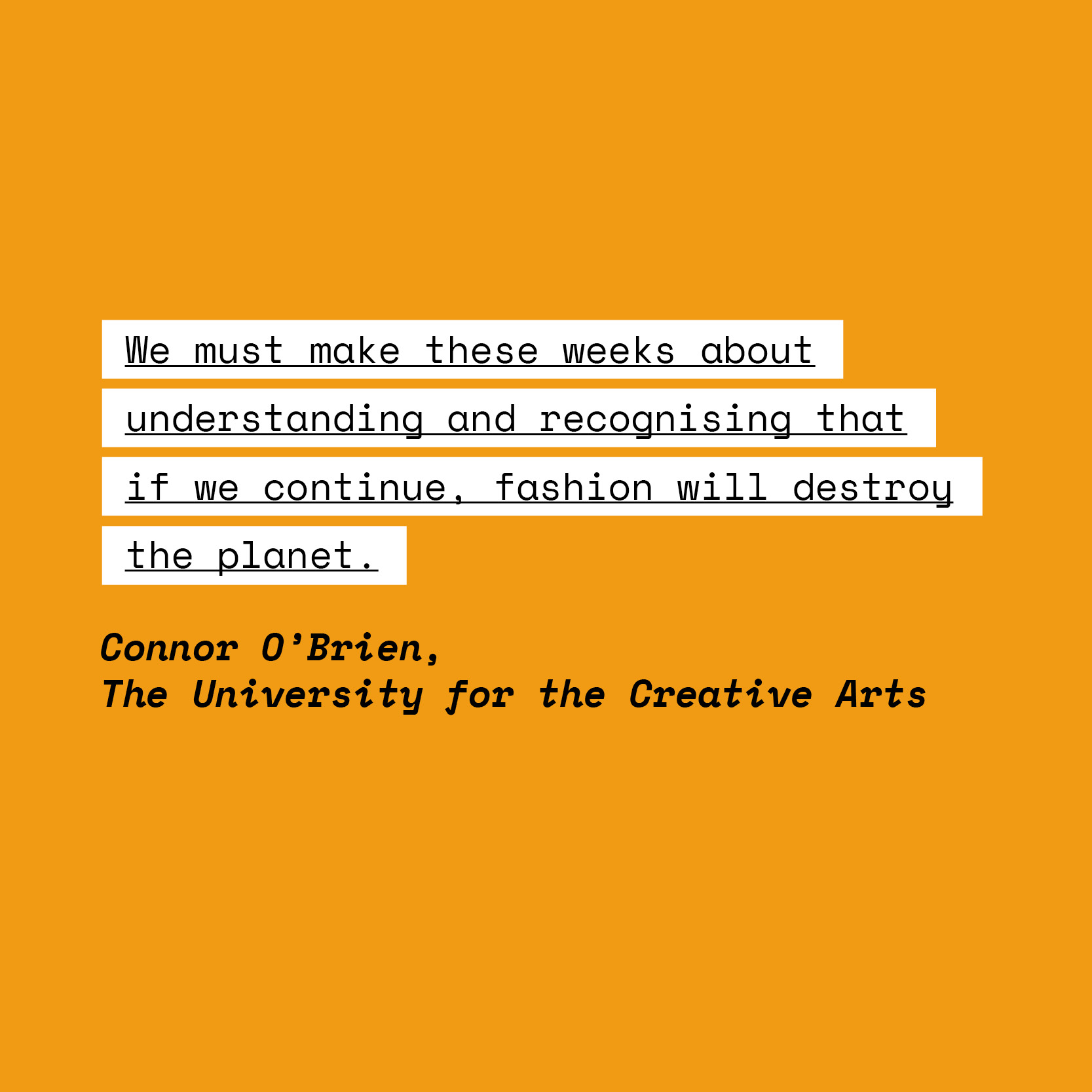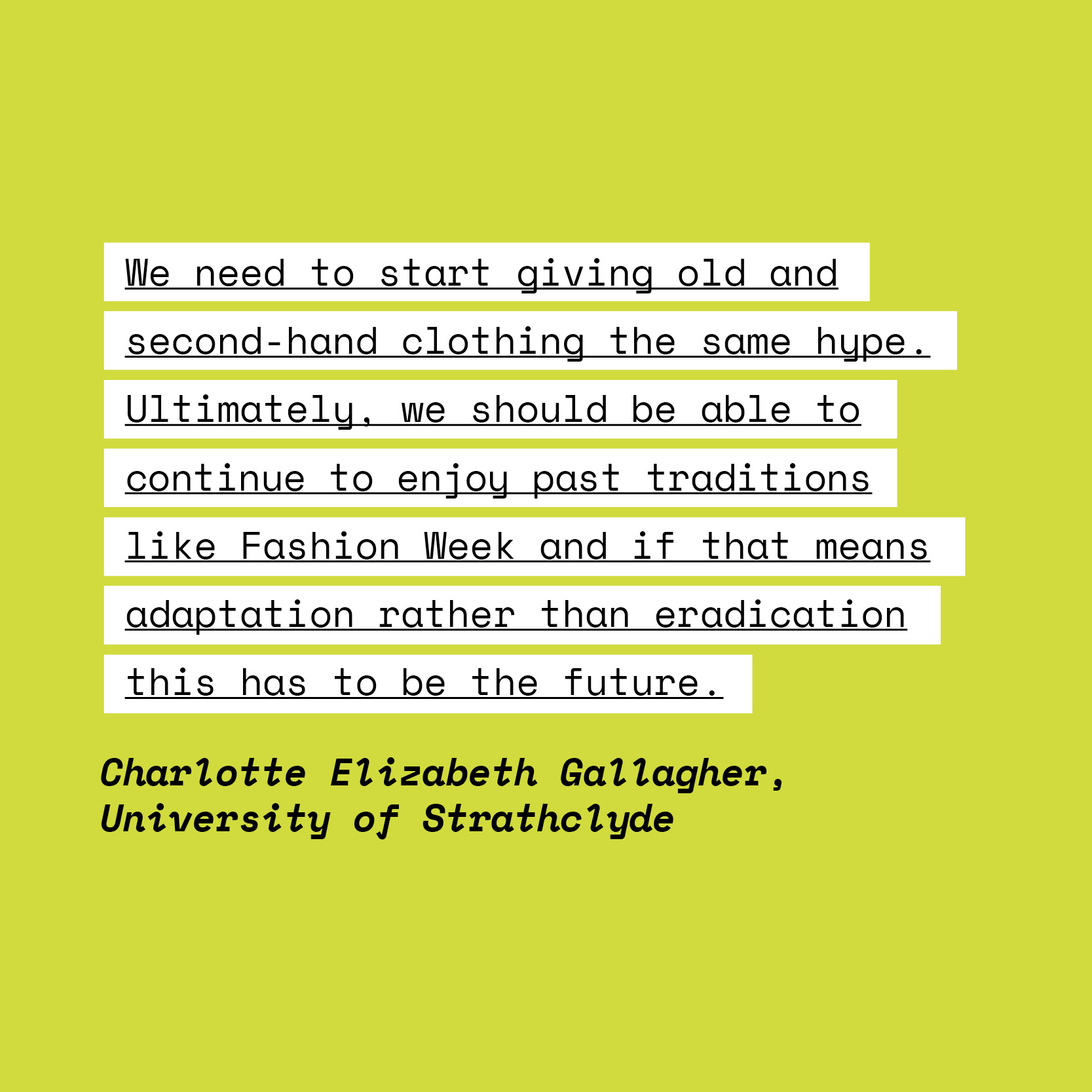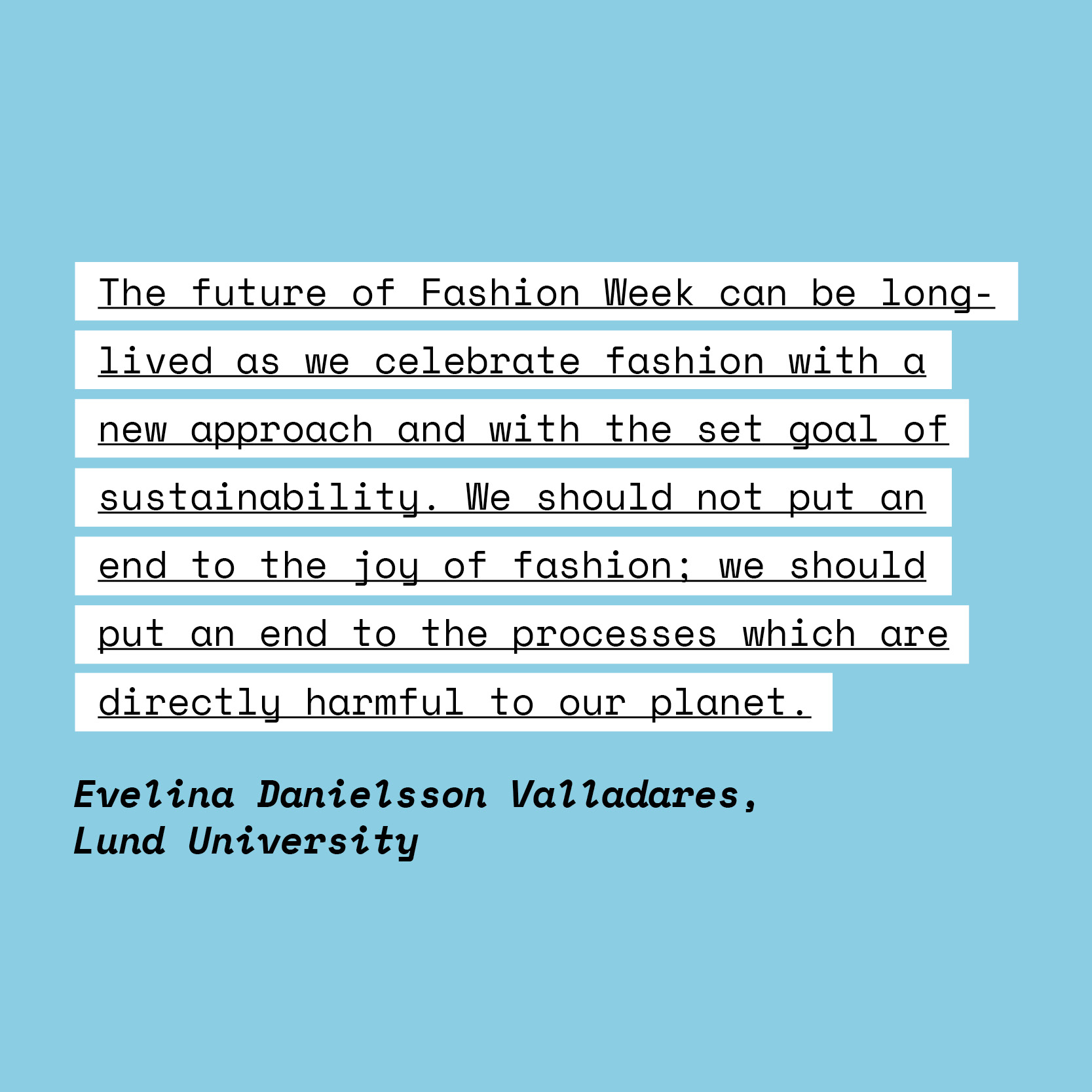Opinion: The Future of Fashion Week
As the debate around Fashion Week continues we decided to ask the next generation of industry professionals for their thoughts on what future Fashion Weeks may look like. Our network of student ambassadors rose to the challenge and told us their visions for change.

Connor O’Brien
Currently, International Fashion Weeks are only concerned with commerce and consumerism. In the not too distant future, I believe the fundamental purposes of Fashion Weeks are becoming slowly irrelevant, they already have.
The basic reason for Fashion Week is to sell clothing and generate press. Others would argue there are several other reasons that exist. To me, this screams a big problem. As we all know, the fashion industry is causing great destruction to the planet, in a variety of ways. Our natural resources are being depleted at an alarming rate, workers around the globe are subjected to working conditions that are beyond imaginable conditions and the atmosphere is being polluted by the CO2 that we produce. Fashion is responsible for all of these problems.
These weeks gain monumental attention that attract an array of people from all across the world from various job functions. In order to continue we must act responsibly. There is no better place to open a dialogue about how everyone can operate better. This applies to various functions across the supply chain from sourcing to production all the way to consumption and end of use. I hope that these weeks will become a place of discussion, that will share open source solutions for brands to operate more sustainably. A place where education and self-improvement is instilled throughout. Fundamentally, we can celebrate incredible talent in a responsible way but it is imperative that we seek solutions now. We must make these weeks about understanding and recognising that if we continue, fashion will destroy the planet.
Sophie Grapentin
Fashion shows have become performance art spectacles in recent years with venues ranging from the Wall of China to meticulously crafted fantasy worlds – just think back to the Chanel supermarket! Light technology, life music performance and lavish set-design are now integral parts of all fashion weeks. At times these performance aspects can become even more important than the fashion itself. French designer Jean-Paul Gaultier for example toured the world with his ‘Fashion Freak Show’, part catwalk, part burlesque with singing and dancing numbers. London Fashion week is selling tickets to the general public for some walks. It appears highly likely that this will become common practice for all shows. And as the audience changes from industry insiders to enthusiastic amateurs, the character of Fashion Week will too.
Turning catwalks into a stage for public spectacle will mean that focus shifts away from the designer to the team of artisans making the show possible. On a theatre stage we wouldn’t dream of ignoring the actors and technicians to only cheer for the director. It is long time overdue to do the same in fashion. Lagerfeld had already celebrated Chanel’s couture seamstresses on the catwalk in 2016. One can look forward to more appreciation of garment workers in the future.
A strict divide between Spring/Summer and Autumn/Winter has long lost its appeal. With Resort and Pre-Fall the lines between seasons have blurred already. Inexpensive flights and traveling as a new social media status symbol also mean that customers now need summer clothes in winter and coats in summer. The fashion show of the future will include smaller, more curated collections. This will not only mean that customers can choose without being overwhelmed but also ensures that designers can focus on creating fewer pieces they are excited about instead of having to design to ‘fill in’ gaps to make the 40-something outfit mark of a traditional fashion show.
With mindfulness and minimalism being concepts that have gained considerable mainstream popularity in the past years, it seems probable that the fashion industry of the future will take a similar path. The Italian Vogue editor Franca Sozzani might have said that fashion is the closest mirror of the Zeitgeist but she forgot to mention that the industry simultaneously plays an important role in creating the societal and cultural environment of this zeitgeist. And in the current tohubohu of weekly micro-seasons in the high street and the fragmentation of fashion weeks to all over the globe, the fashion world is contributing to a climate of overwhelm and sensory overload. The victims of this system are often the weakest links in the creative chain: small designers, garment workers and ultimately the planet. Social media provides a platform for transparency thanks to ‘fashion watchdogs’ like Diet Prada who point out plagiarism and stand up for the rights of indie designers. But as fashion activist Sinead Burke rightfully said in a recent talk, with the intense pressure of creating such a large amount of original designs at the current rate, incentives to copy someone else’s work are plenty. And while members of the industry seem to suffer most, this über-provision of new garments equally takes away from the consumer. Who can really enjoy buying a dress when you not just have to select from an impossible amount of choices but also know that it will be out of fashion before you even manage to wear it?
Charlotte Gallagher
With sustainability slowly becoming the centre of every conversation – and rightly so – fashion week takes the brunt of the criticism. The week showcases upcoming and incumbent designers in what could be depicted as a considerable capitalistic setting, promoting overconsumption. Having said this, when thinking about the future of fashion, eradicating creative outlets like Fashion Weeks seems slightly excessive. For many young designers Fashion Week is the first opportunity to get their name known and brand understood to buyers and press.
There has to be a different answer to the future of LFW, specifically, than merely putting a stop to a thirty-five year old world phenomena. In a society that is constantly changing, it is important to maintain ties and lengthen parallels from the past, into the future. Fashion weeks should be altered to become more sustainable through moving the entire focus away from simply the catwalk. The British Fashion Council are already allocating more time for exclusive presentations at LFW. These presentations are an artistic showcase and push boundaries from a more traditional setting.
Furthermore, with more environmentally-conscious designers on the rise LFW is an outlet to spread the importance of sourcing, producing and selling sustainably. In my eyes the main issue coming from Fashion Week is the concentrated celebration of “new” collections and clothes. Within the media this is where the main frustrations lie, we need to start giving old and second-hand clothing the same hype. Ultimately, we should be able to continue to enjoy past traditions like Fashion Week and if that means adaptation rather than eradication – this has to be the future.

Patricia Monroe
Although it wasn’t its original purpose, over the years Fashion Week has developed a social factor as prominent as its creative one, it has evolved to something that could be described as a marketing performance.
The corporatization of social movements popular in social media between younger people, such as Pride and Feminism, has become more and more common in Fashion. But can these retailers say they support them when their work ethics say otherwise? Sustainability, inclusivity, and transparency are crucial in Fashion week and Fashion as a whole, we need to close the gap between the retailer and the consumer for it to be able to evolve to something greater.
Nayanika Bharadwaj
With approximately 10.5 years left to save the planet from a potential climate apocalypse, it is crucial as ever to evaluate just what the future of fashion should be and how the industry will need a revolutionary transformation across the entire gargantuan system. The old commandments of super-fast growth, making and selling as much as possible, and transitory trends are fast being seen as grossly unsound, as consumers start to make shifts in where they buy and what they consume. There is a steep rise of supposedly conscious brands while the big ones release long-term sustainability plans in an attempt to show that they ‘understand’ and ‘care’.
As the glossy greenwashing alarm sounds off in my brain, it does prompt several questions to come to mind, of whether and how we can ensure the deep cracks in the setup are not only repaired (because mending is always good), but that the system also be transformed into something living, lasting and holistically sustainable. Can fashion ever transition to a completely circular economy? Will rental, second-hand and swapping overtake buying brand-new? Will lab-grown materials finally become commercial? Will consumers ever finally make the swap to truly slow and mindful? Can fashion ever make sense of its complex supply chain systems and ensure more-than-basic rights to every human involved? Will world governments start to take the industry and its impacts seriously? And, most importantly, can Fashion be Great Again?
Evelina Danielsson Valladares
Fashion week is an event to celebrate the art of fashion; the creative processes that is showcased in a collection of garments. The clothes displayed shows a story and a vision about the future. The event is one way of consuming fashion, which is beautiful and brings joy. A negative opinion about Fashion Week has recently been discussed by promoting an end to Fashion Week, which has been brought up in the spirit of sustainability. Surely Fashion Week is another medium for the industry to push a need for new clothes, which accelerates consumerism and in conclusion; brings harm to the planet and the people producing the clothes. But one of the underlaying problems in this discussion is that an equal sign between fashion and clothes is being made.
If we separate fashion from clothes then Fashion Week could be seen with a holistic approach, where we can consume fashion for its visual and artistic aspects. By then we could enjoy fashion as it doesn’t conclude in over consuming clothes, which is the core problem when it comes to a sustainable and ethical fashion industry. For this to become a reality we must shine light on the problems of overconsumption and join forces towards the goal of making the fashion industry sustainable. The future of Fashion Week can be long-lived as we celebrate fashion with a new approach and with the set goal of sustainability. We should not put an end to the joy of fashion; we should put an end to the processes which are directly harmful to our planet.







